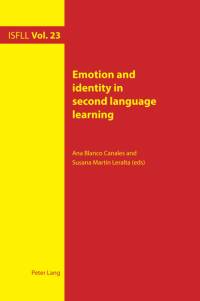Om Emotion and identity in second language learning
This book brings together 18 theoretical and empirical chapters that analyse the role of emotion (expression, perception, processing) and identity (notions and representations, construction, conflict) in the process of learning a second language. Studies on the differences in emotionality between L1 and L2 suggest that in L2 there is an alteration that, in many cases, manifests itself as a decrease in the affective load, which can lead to a certain indifference to the emotional content transmitted and to a lesser involvement in communication. It is also known that emotion plays a fundamental role in the construction of identity in a second language in the shaping of the self that feels and communicates and in the ability to cope with the learning process.
Most of the studies have focused on the understanding of these issues in balanced bilingual speakers, but there is little evidence on their functioning in speakers with other degrees of proficiency (the case of second language learners) and on their role in the learning process. Better understanding this question is fundamental for the improvement of everything related to second language acquisition. We need new and innovative approaches that lead to more effective programs, increased interest in language learning and the consolidation of multilingual societies.
Visa mer

